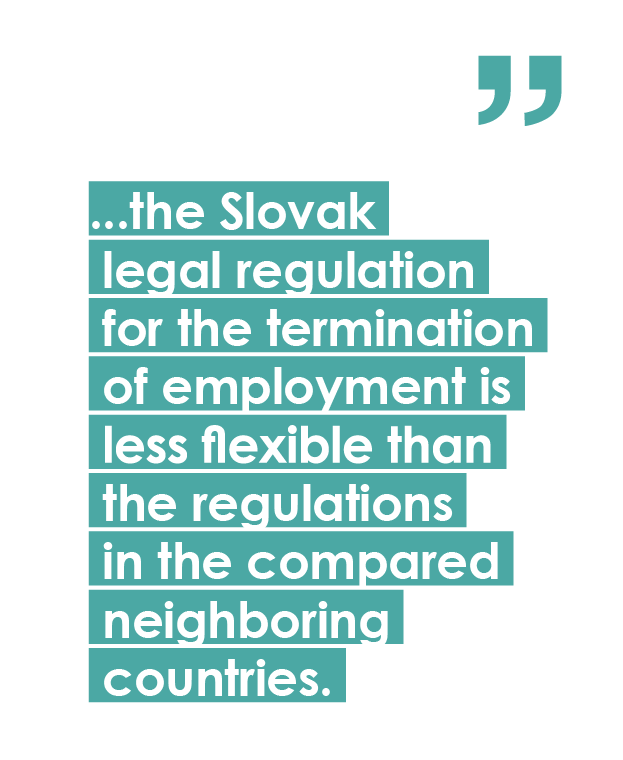The flexibility of employment relationships plays a vital role in the assessment of a business environment. Multiple aspects define the flexibility of these relationships. These include, for instance, the possibility of managing working time, wage regulation or employment termination rules. It comes without saying that employers seek flexible rules allowing them to respond effectively to their needs. It is especially important in times of economic slowdown and uncertainty. On the other hand, one of the main aims of the labor law legislation is to protect employees when it comes to the termination of their employment. There is a fine line between the interests of both sides, and a legislator should find a suitable balance between the needs of employers and the protection of employees. As will be shown below, the Slovak Labor Code is, in certain circumstances, less flexible when compared to the rules in the Czech Republic and Poland.
 Notice Given by the Employer – Exhaustive Reasons?
Notice Given by the Employer – Exhaustive Reasons?
The Slovak Labor Code, similar to the Czech Labor Code, stipulates quite strict rules for employment termination by the employer. While employees can serve notice for any reason or without reason, employers can only do so for one of the reasons set out in the Labor Code. These reasons include, for example, redundancy, the relocation or closure of the employer, or certain instances when the employee loses the capabilities to perform the works. A common feature of both regulations is that these reasons are strictly stipulated by law. This is in stark contrast to the rules applicable in Poland. Under Polish law, even though the employer is required to give reasons for serving the notice of termination, the list of grounds for a notice of termination is open-ended. The limitation is that the reasons must be real and justified. This clearly makes the process of employment termination more flexible.
Obligation to Offer Alternative Employment
Similarly, compared to the legal regulations in the Czech Republic and Poland, the Slovak Labor Code prescribes the obligation to offer alternative employment to employees when serving the termination notice. Although there are a few exceptions to this rule, it can obviously make the termination quite burdensome, especially for larger employers, which usually have vacant positions. In addition, such obligations appear obsolete in economies with an almost natural unemployment rate. To the contrary, the Czech and Polish regulations do not prescribe such an obligation.
Wage Compensation in the Case of Invalid Termination of Employment
Significant difference among the compared countries is also evident in the case of invalid terminations. The sanctions for invalid termination under Slovak law are an obligation on the employer to employ the employee and to pay wage compensation to the employee. In the Slovak Republic, the cap for wage compensation in the case of an invalid termination notice is 36 months. On the other hand, the cap in Poland is only three months and the cap in the Czech Republic is six months.
Redundancy payment
Slovak law is also strict in the case of redundancy payments. Under Slovak law, the amount of redundancy pay depends on the mode of termination and the length of service. Statutory redundancy pay is generally up to four times of average earnings in the case of termination by notice, or five times in the case of termination by agreement. Under Polish law, redundancy pay is up to three months’ pay, with the statutory cap being no more than 15 times the minimum wage. In the Czech Republic, the limit is up to three months’ pay, with an exemption in the case of industrial injury, occupational disease or similar.
 These examples demonstrate that the Slovak legal regulation for the termination of employment is less flexible than the regulations in the compared neighboring countries. These differences can cause Slovak employers to hesitate when seeking new employees in times of economic slowdown and uncertainty. In addition, they can motivate some employers to relocate their employees abroad and can have a negative impact on the Slovak economy and employment, as such.
These examples demonstrate that the Slovak legal regulation for the termination of employment is less flexible than the regulations in the compared neighboring countries. These differences can cause Slovak employers to hesitate when seeking new employees in times of economic slowdown and uncertainty. In addition, they can motivate some employers to relocate their employees abroad and can have a negative impact on the Slovak economy and employment, as such.
The countries selected for comparison in this article are our main competitors in the region when it comes to employment. Therefore, it is legitimate to seek that the new government should assess the impact of these rules after the 2020 election. The main aim should be to introduce rules that are more flexible, but at the same time, sufficiently protect employees. Ultimately, not only employers, but also employees will benefit from them.
What is the cost of termination of employment?
Indeed, it can be a costly endeavor. Labor law legislation imposes various obligations, often resulting in excessive burden on employers in relation to the termination of employment. Is the Slovak Republic as competitive as the Czech Republic and Poland when it comes to the flexibility of employment termination?
Human Capital: Education and Labor
- Young Slovak talent needs you
- Serious issues, not too seriously…
- What should school teach us - through the eyes of a thirteen year old girl
- The what and how of Slovak education system
- The evidence based education reform of the Learning Makes Sense initiative
- Uniting forces to give Slovak education a needed boost
- The taboo called entrepreneurship education
- Strengthening the Transatlantic bond
- Solve your problems by helping others
- What is the cost of termination of employment?
- Trust is essential for a successful company
- Employer branding is not only about hiring
- Agility isn´t a new Hollywood diet
- Data analytics in HR management and its impact on the quality of decision making
- Humans wanted: Robots need you




Follow us